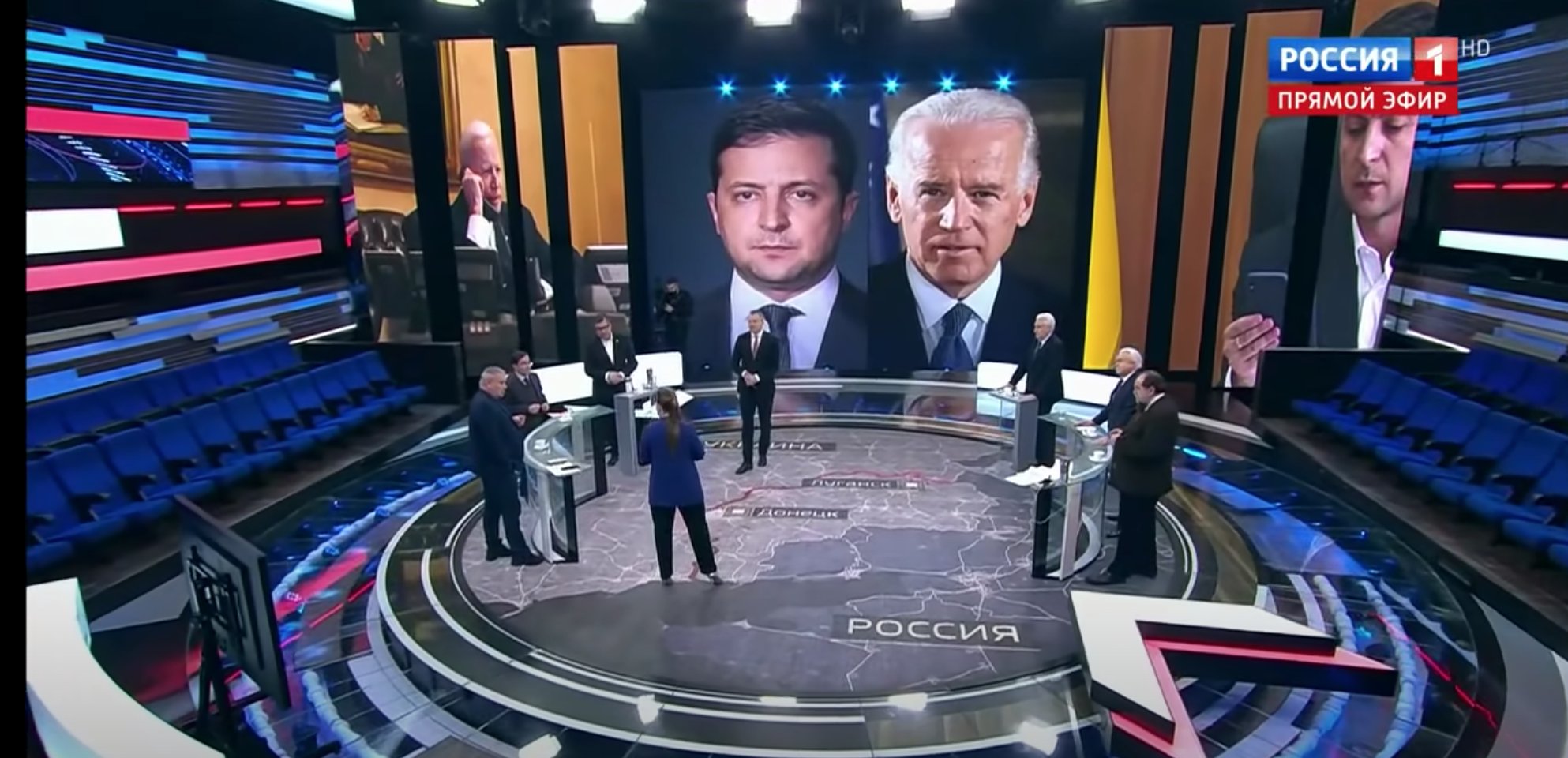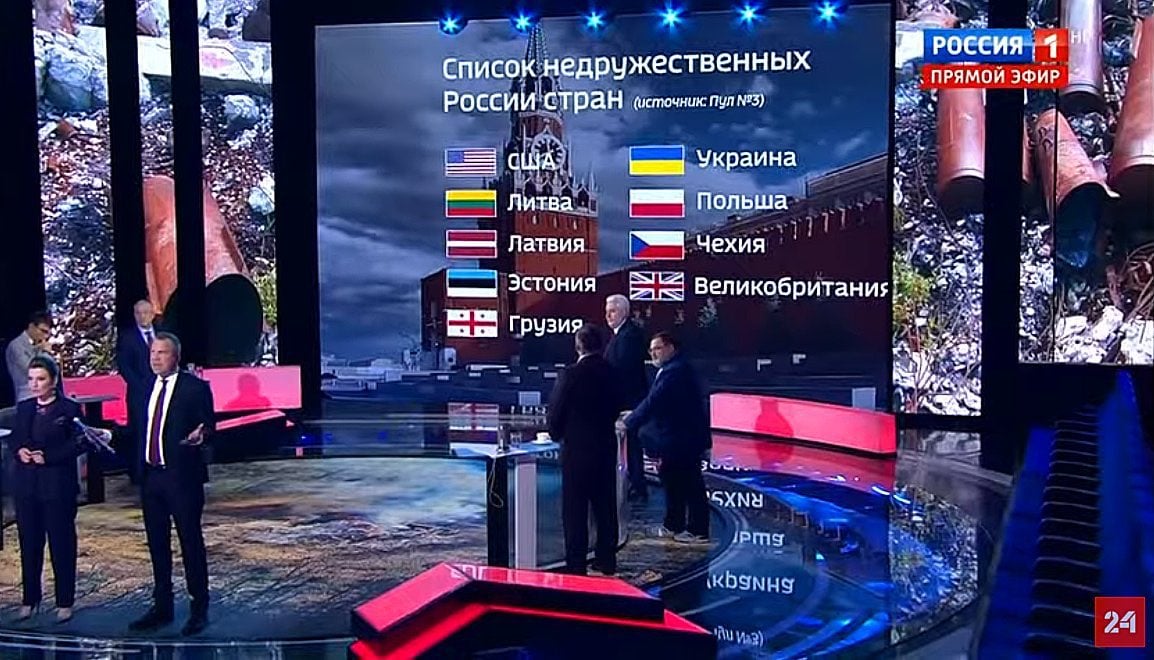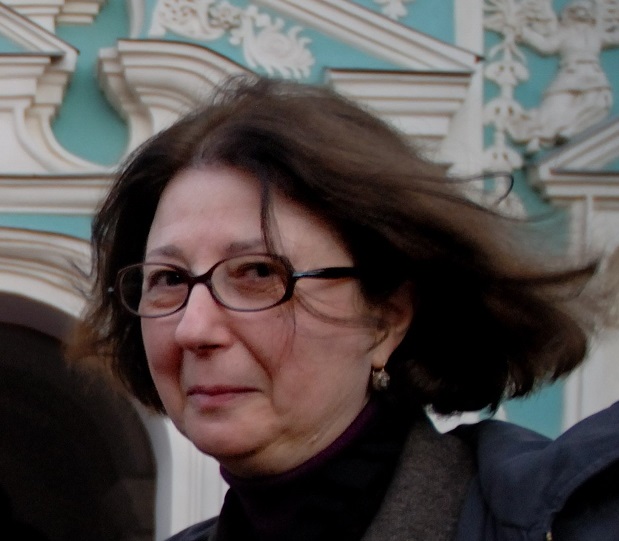
Putin’s "Gleiwitz boy" incident: Ukrainian soldiers purportedly killed 5-year-old boy by drone
“There are 500,000 Russian citizens in Donbas already. And we will protect them,” - claimed Skabeeva, referring to the issue of Russian passports supplied to residents of occupied Donbas.The Russian desire to protect “its” citizens in Donbas was already predicted by analysts when the massive issue of Russian passports started in Donbas in 2019. Often people received passports just to obtain social benefits and were then used by Russian propaganda. During the TV program, Skabeyeva did not miss the opportunity to once again remind Russians of the “massive” build-up of Ukrainian military forces near Donbas and the alleged preparation of an offensive by Ukrainians. She however forgot to note that the video demonstrated to support the claim was dated back to 2019 and was a recording of Ukrainian military drills by Defense Express.

Unprecedented wave of disinformation about “Ukrainian and NATO plot against Russia”
Since March, and especially after the fake story about a Ukrainian drone, Russian media intensified its reports on alleged “Ukrainian provocations” in Donbas, along with an imaginary build-up of Ukrainian military forces to attack Russia. That is despite the fact that in August 2020 a new truce was signed in Minsk. Although it was never observed fully, the Ukrainian army followed Zelenskyy’s order to stop preventive fire, responding only in case of targeted shooting from Russian militants. On 9 April, the head of the so-called Donetsk People's Republic (DNR) Denis Pushilin said that Kyiv was ready to start full-scale military operations in the southeast of Ukraine. Referring to the imagined threat from Ukraine, the occupiers declared a first wave of military conscription in occupied regions of Donbas. On 14 April 2021, the Russian Security Council Secretary Nikolai Patrushev said that Ukraine could allegedly organize a provocation to launch hostilities towards Crimea, and could prepare terrorist attacks in Russia and other countries. He even claimed that Ukraine, with the support of Western countries, allegedly created “training centers for sabotage and intelligence groups”, which “may be preparing terrorist attacks in Russia and other countries." Although such imaginary actions contradict the Ukrainian strategy of peaceful deoccupation and, if implemented, would only harm Ukraine, they perfectly serve the Kremlin goal of making the Russian public feel threatened. In the best scenario, Putin needs an imaginary enemy to consolidate Russians before the September elections to the Russian parliament. So far, Putin’s party is entering the elections with the lowest support ever. Naturally, massive military training and demonstration of force may serve this very goal. Yet, in a worse scenario, the imaginary enemy, dehumanization of Ukrainian soldiers and stories about killed children are important to make Russians feel ready to fight against Ukraine in a full-scale war. Weekly press releases by Maria Zakharova, spokeswoman for the Russian Foreign Ministry, are the best examples of this constant building up of an enemy, as Stanislav Zaryn in his article for The Critic puts it:“Zakharova’s weekly pressers are festivals of aversion, hostility or even hatred towards the countries caught in the Kremlin’s crosshairs. The world is evil, the West is depraved and corrupt, it poses a threat to Russia — such are the main messages spread by Zakharova... The elites of the Kremlin want the Russian public to feel threatened by an imaginary foreign enemy; it helps to consolidate society around the country’s political leadership. It is therefore granted that the harder the situation (of the Kremlin elites), the more blatant and shameless these lies will get.”Similar messages about a “hostile Kyiv” threatening Russia were voiced by Russian Minister of Foreign Affairs Sergei Lavrov, who expressed Moscow’s “regrets” at Kyiv raising its military potential and urged Berlin and Paris to "immediately bring to the awareness" Ukrainian authorities, as if Ukraine had no right to have its military and defend itself. In line with Kremlin narrative about the US controlling alleged Ukrainian hostile provocations against Russia, Putin’s spokesman Peskov said:
"Washington can perfectly use its influence over Kyiv (sic) to induce Ukrainians to abandon provocative actions."What provocations Peskov has in mind is unclear. The Ukrainian military in Donbas still refrains from preventive fire despite taking casualties. Rather limited Ukrainian military exercises only commenced after 8 April as a response to a Russian buildup along Ukrainian borders. The Kremlin’s puppets in Donbas also repeat the Kremlin narrative that Ukrainian authorities are allegedly trying to bring the conflict in Donbas to a hot phase and provoke the unrecognized republics to respond militarily. Finally, the most comprehensive was Konstantin Kosachev, Vice Speaker of the Federal Council, the upper chamber of the Russian parliament. He expressed the Russian version of reality, claiming that by amassing troops along Ukrainian borders Russia is allegedly preventing the conflict and a Ukrainian offensive:
All of Russia's current actions regarding the southeast of Ukraine are aimed at only one thing – preventing a military operation by Kyiv. This is the focus of the talks between the President of Russia and the partners in the Normandy format, the efforts of the Russian special envoy Dmitriy Kozak... the work of our colleagues in the contact group, and finally, a demonstration of readiness not by words, but by deeds to protect our citizens and compatriots from the use of military force. And this is also the prevention of conflict, not its incitement.Yet, not by Ukraine alone. The other narrative actively distributed by Russian media is the alleged NATO preparation for an offensive against Russia. Russia Today (RT), the Russian propaganda machine founded by the state, is actively disseminating this narrative to international audiences.
“The real danger is not a Russian invasion, but that the Ukrainian government will misinterpret American signals of support as a green light for an assault on the rebel republics in Donbas,”says the RT article, reversing the order of events and claiming that the Russian military build-up is just a response to NATO activity.
“A full-scale Ukrainian war would threaten Russian security, the Kremlin warns, pledging action to prevent a ‘humanitarian catastrophe’,”says one of the headlines, portraying Moscow as a regional peacekeeper, despite the fact it has occupied Transnistria, Abkhazia, Osetia, Donbas, and Crimea. Yet to have an effect on a Western audience, RT uses such words as Ukrainian nationalists and genocide, sensitive for the West. Ukrainian nationalists are about to conduct “a Srebrenica massacre” in Donbas, claims RT. The agency quotes the Russian president’s Deputy Chief of Staff Dmitry Kozak as saying:
“If there [in Donbas] is, as the president says, a Srebrenica, we will be forced to stand up for ourselves.”Kozak also refers to Putin’s comment in 2019 that he fears a genocide in Donetsk and Luhansk, if Kyiv regains control over Donbas. Thus Russian propaganda manages to create genocides “in advance.” Although clearly imagined fears, they work as real reasons for real military activity.
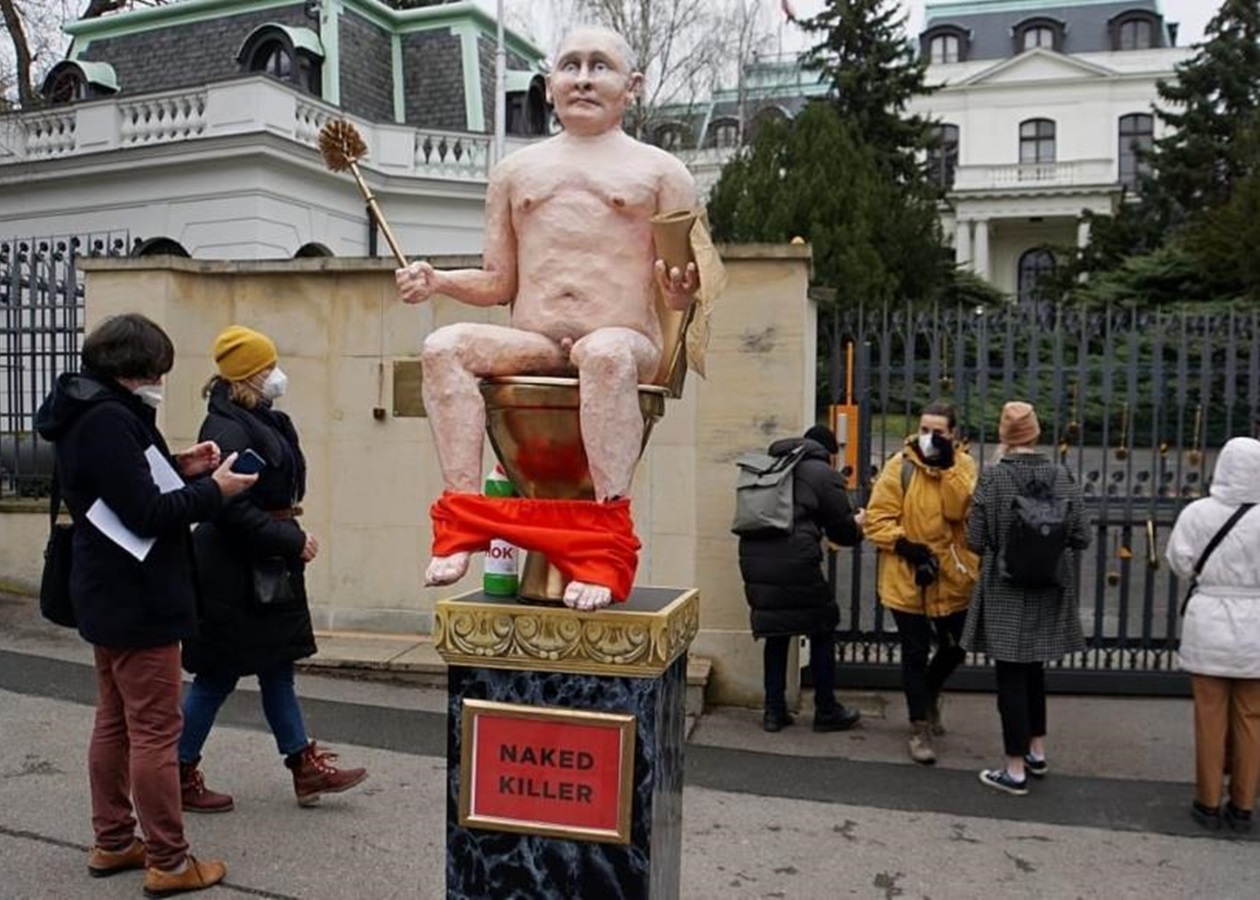
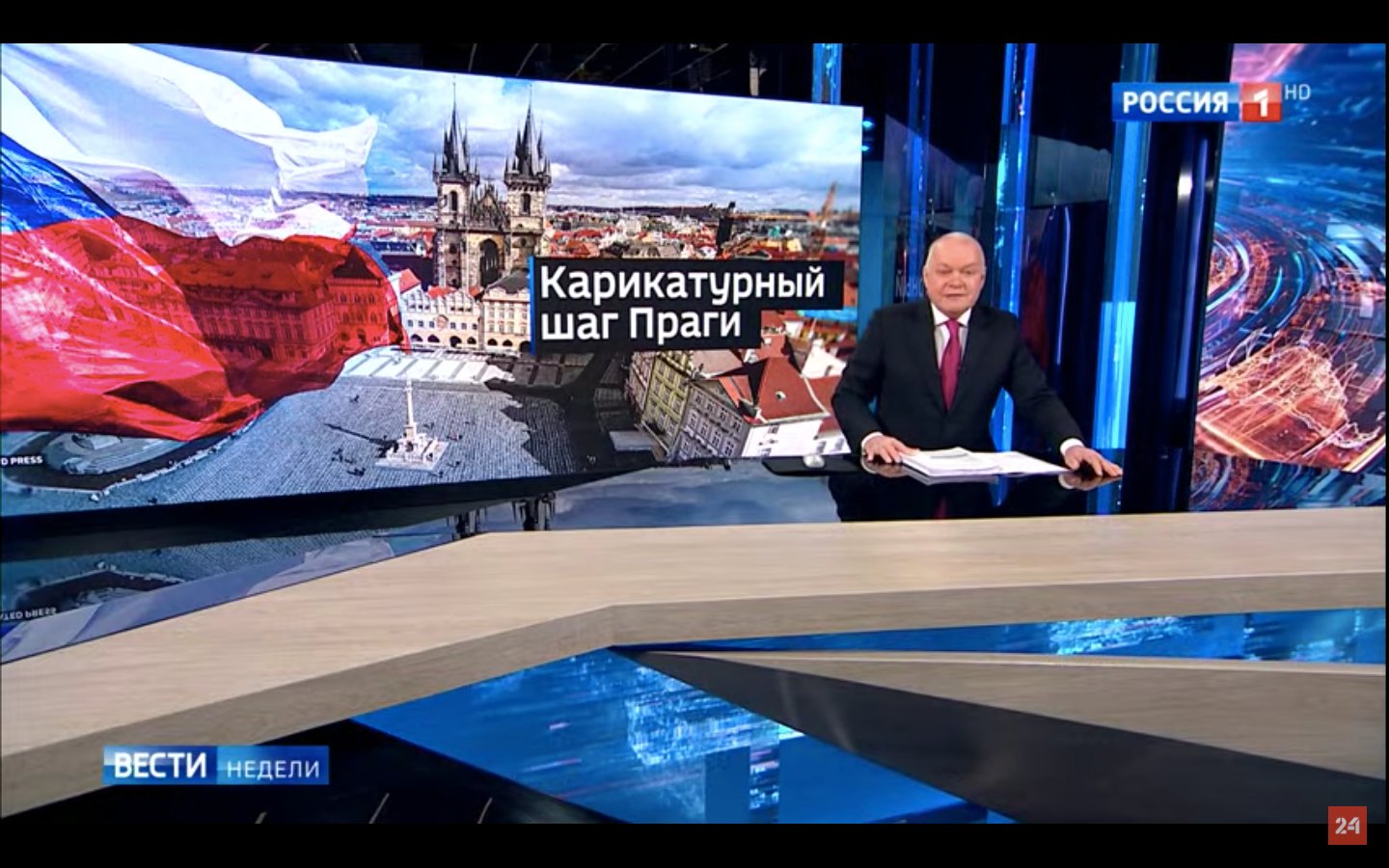
“Will the West back Ukraine if Kyiv starts a war?” asks a RT journalist, making Ukraine an aggressor, and a speaker from London whitewashes Russia
During the cross-talking for the English-speaking RT audience, titled “The end of Ukraine?” the journalist boldly summarizes the situation:“Will the West back Ukraine if Kyiv starts war?.. The rhetoric of Kyiv is quite harsh, Moscow is reacting. Who is driving it? Is it Kyiv, is it Washington, is it a combination of both?”Having nothing to accuse Ukraine of, the Kremlin journalist refers to “rhetoric” which in fact became more appeasing after Zelenskyy’s elections in 2019. The journalist refers to Zelenskyy’s presidential directive number 117/2021, loudly labeling it as “fighting words.” Although the directive is about the de-occupation of Crimea, it rejects a military scenario for a strategy of peaceful deoccupation. Mary Dejevsky, a columnist from London writing for the Guardian and Independent, emotionally answers to journalist’s question:
“I couldn’t take this seriously that Russia would actually want to wage military action that would result in any sort of military confrontation in eastern Ukraine or anywhere in Europe. It’s just seen completely crazy to me.”She claims that the international audience has a biased understanding of events - many reports about Moscow’s military build-up, and no reports about what is going on in NATO and Kyiv. It is hard to refer to such answers and arguments frostily, considering that Russia already waged military actions against Moldova, Georgia, and Ukraine in 1991, 2008, and 2014. It is not surprising that it continues its aggressive policy today by amassing more troops on the border just at the time when Zelenskyy tried to maintain a truce on Donbas.

Trending Now
“Sunday Evening with Vladimir Solovyev” — the heavy artillery of Russia’s domestic propaganda
“Two hours per day of pure fascism” - thus summarized Ukrainian journalist Yevhen Fedchenko the Russian TV show with Solovyev in his tweet:Indeed, Solovyev’s evening programs are the concentration of Russian domestic propaganda and probably the best ever weathercock to detect the direction of Kremlin winds. The most comprehensive Sunday show broadcast on 11 April 2021 summarized the Russian version of reality which justifies and explains the military buildup.Every evening #Russian propagandist Solovyov who lives in Italy fuels hatred & animosity against #Ukraine, #EU, #US. Leitmotif - superiority of Russia as civilisation, quasi-religious Russian nationalism, decadence of the West, mobilisation for war. 2 hours/ day of pure fascism pic.twitter.com/FiSVHyAnfP
— Yevhen Fedchenko (@yevhenfedchenko) April 6, 2021
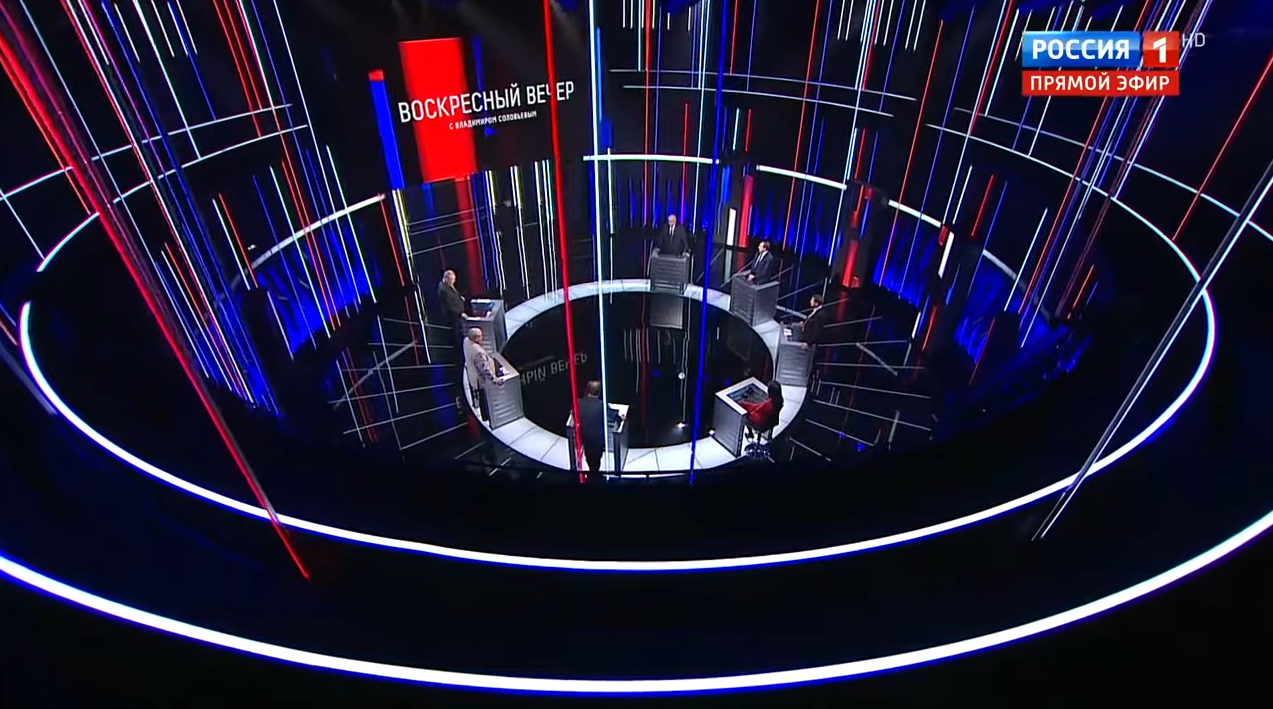
“The war is inevitable – we can't reach any compromise, we can’t allow that we become another nation,”says Margarita Simonyan referring to Russian history and claiming that it is Russian history that constitutes the Russian nation. Russians cannot forget their history and take another path. These words uttered by Simonyan are probably the most precise explanation of why Russia is waging its current proxy war against Ukraine and further distancing itself from the West. Russian history has always been about the dominating empire -- an equal role among other nations contradicts this history, making Russia “another nation.” Perhaps the democratic minority in Russia desires just this “other nation”, but this is unacceptable to the current political elite who are mostly over 60 and still carry a Soviet mentality.
“We should take Donbas and protect it from Srebrenica, or our own people won’t understand us,”

“If we do not cut Ukraine in half, the nuclear weapons of NATO will be located in Kharkiv and Dnipropetrovsk,”continues Zhirinovskiy, directly stating that such a scenario is “unacceptable for us.”
“We cannot allow missile systems in Kharkiv or Dnipro. We lose the battle”NATO in Ukraine would be the end of Russia. NATO troops in Ukraine would mean the end of any even imagined Russian domination in the region. This is the source of all hysteria in the media regarding Ukraine and NATO as well as the recent military build-up. It looks like the last desperate jerk of the failing empire, although still dangerous.
The bottom line
Read also:
- Russia’s triple strategy of proxy war used against Georgia in 1920 and now
- Four Ukrainian soldiers killed in Donbas as Russia continues troop buildup and escalates propaganda
- Moscow moving 15 warships from Caspian Sea to waters off Ukraine
- Russia violating international law by closing Kerch Straits to naval vessels until October, Kyiv says
- Advisor to Russian Defense Minister warns of ‘mental war’: who is waging it and against whom?
- Seizing Ukrainian water for Russian-occupied Crimea #1 task for Putin, Illarionov says
- Russian buildup, MH17 tapes, and plans for a Ukrainian Silicon Valley | Weekly news roundup
- “Poke-and-probe.” Why Russia is massing troops & military hardware along Ukraine border

